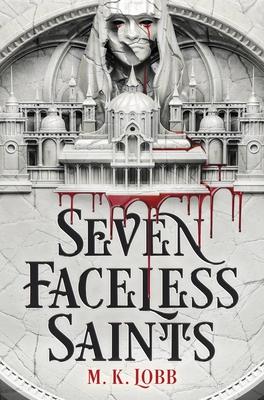
Seven Faceless Saints is a dark but exciting debut novel from M. K. Lobb. It takes a bit to get into the story, but this is because we spend the first portion of the book weaving into and out of two very traumatized main characters’ minds. Once we understand their world and their traumas a bit, the story takes off into one of revenge, power, religion, and war. It is a story that feels familiar while different, thanks to the fantasy elements of magic and gods. Moreover, it is the type of story you fully appreciate upon finishing.
In Seven Faceless Saints, Ms. Lobb deviates slightly from the standard fantasy worldbuilding by not building her society around a monarchy. Instead, we have an intriguing blend of oligarchical and theocratic governance. Ombrazia worships its saints; the church and those who have powers directly from one of those saints feature predominantly in everyday society. At the same time, there is a separation between religion and the government, run by an elected committee and headed by one committee member elevated above others based on experience, power, and money. Granted, it all gets a lot more complicated than the basic layout, but I like the changes Ms. Lobb features. Usually, the church fights against those in power, hoping to gain more control for itself. In Ombrazia, the two work in tandem, and the results are fraught with their own set of complications.
Another area in which Seven Faceless Saints breaks from the fantasy norm is its rebellious factor already exists. Not only that, but it has an organizational structure and significant plans. So often, our hero or heroine is at the forefront of a burgeoning rebellion. The same is not true here, significantly affecting how we see Rox’s character.
Speaking of characters, the two main characters should come with their trigger warnings. Bastian has significant PTSD from his time in battle, and we get reminders of that in almost every scene. Rox has her traumas, but they are subtler and hide behind her anger and desire for revenge. Between the two of them, there is enough pain and anger, loss, and fear that you feel like you need a therapist after reading one of their interactions. At the same time, I can’t imagine them any other way. For Bastian and Rox to work as individual characters, they need their heavy backstories and all the psychological traumas that come with those histories. Bastian runs on his fear of returning to the front, and Rox runs on her anger. They are both deeper characters for having experienced what they have and for their determination not to let those experiences define them.
As a couple, we know from the onset that theirs is a complicated relationship, but Ms. Lobb does an excellent job of not sharing all the dirty details until we are already hooked on these two and their fates. When we get the complete picture, it is such a doozy that you wonder how they will ever be able to move beyond their past. That they do and that you are okay with how it happens is a testament to Ms. Lobb’s skill and willingness to allow both characters the time and space to figure things out without undue pressure.
While I broke out each element above to explain what I liked about them, it is challenging to see them as separate entities. The Saints and their stories are so intertwined with the church, which is all tangled into the government and society, that you cannot have one without the others. Even describing them as separate in the above paragraphs was challenging because it only scratches the surface of what makes up the world where Ombrazia is one major city. The same goes for the rebellion, the military, Roz, and Bastian. To remove even one piece would see the entire story of Seven Faceless Saints collapse. It is a writing level you don’t usually see in many authors, let alone debut ones.
M. K. Lobb’s Seven Faceless Saints is a refreshing fantasy novel that avoids following the usual paths set forth by fantasy authors. From its highly structured and complicated government system to the people’s ongoing rebellion, we know from the start that Seven Faceless Saints will be different. Meeting Roz and Bastian and their breathtaking array of trauma confirms that suspicion. What Ms. Lobb creates in Seven Faceless Saints is a painful but touchable story about two young people that are pawns to a greater unknown, which may or may not include a long-thought-dead Saint. It is a familiar story but so different from anything I’ve ever read. With its cliffhanger-esque ending, I cannot wait to see where Ms. Lobb takes us next.
